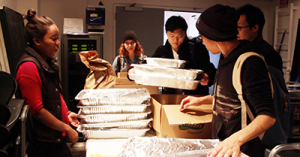 Not many people would give up a lucrative career at a top financial firm to collect leftover food and redistribute it. But Robert Lee is not like many people. He gave up a finance job at JP Morgan to follow his passion of feeding the hungry.
Not many people would give up a lucrative career at a top financial firm to collect leftover food and redistribute it. But Robert Lee is not like many people. He gave up a finance job at JP Morgan to follow his passion of feeding the hungry.
Robert Lee, the son of Korean immigrants, knows better than to waste food. His family struggled to get by when they first arrived in the US. “We moved around a lot before we settled down,” says Lee.
Because of the family’s financial difficulties, food was never taken for granted in their home. Lee relished the school lunches he got at elementary school. This was the first time he encountered food waste. “I always ate my lunch. But many of my classmates would complain about it saying it was bad. Others would even throw it out without eating it. I always thought that was just crazy.”
It wasn’t until Lee got to college that he learned the truth about just how much food goes to waste in the country. Lee joined a group of students that collected and delivered food left over from the university dining hall to nearby homeless shelters. He learned that food insecurity wasn’t a problem restricted to third world countries. One in every six Americans struggles with it. The irony is that 40% of food in the country goes to waste.
“That 40% could actually be enough to put an end to hunger,” said Lee.
The Beginning
After graduating from college, Lee decided to take the food rescue concept and expand it off the campus. He founded Rescuing Leftover Cuisine with the help of Louisa Chen, also a NYU alumnus. The non-profit organization collects fresh food that restaurants in New York City intend to throw out and distributes it to those who need it.
The food is picked up from the restaurants by volunteers seven days a week. It is then delivered to shelters and food kitchens in New York. The restaurants that take part are partners of the organization. So far, volunteers have rescued and distributed over 100,000 pounds of food.
“It wasn’t easy in the beginning,” says Lee. “Many of the restaurants had never heard of such a concept. They were afraid of legal liability of the food they donated. We had to explain that they were protected from any legal liability except in the instance of gross negligence.”
The organization has expanded its mission to cover six other cities in the US and has an app through which volunteers can sign up.
